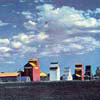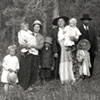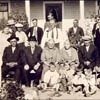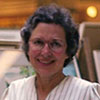Thrice Pioneers
A Readers' Theatre about a Pioneer Family
who settled in Barons, Alberta in 1903
Script written by Lillian Munz, Calgary
Jakob and Mari Erdman's Journeys
August, 2007 Version (07-08-04 fine edited)
From Estonia to Crimea
To Dakota to Barons
1861-1933
This is a Readers' Theatre Script prepared for the July 31, 2004 Barons Centennial by Lillian Munz of Calgary, great-granddaughter of the pioneers, Jacob and Mari Erdman. An earlier script was prepared in 1990 for family reunions in Barons. This reading was also performed in Calgary and in Vancouver at the Estonian Society there, and in Crimea at the 140th anniversary of the 1861 trek from Estonia to Crimea A copy of the earlier script is now in the E. Vilde Museum in Tallinn, Estonia.
Commentator: One hundred years ago settlement in North America was growing rapidly. People from all over Europe were leaving their communities and relatives behind and sailing across the Atlantic Ocean, then traveling by train or wagon across our vast continent. Why did they come to the wide open prairies?
The prairie in southern Canada was covered with wild grass and buffalo bones. Beneath the grass was rich earth. News spread over Europe that land was available in the West at $10 for a quarter of a square mile of natural prairie grassland. The pioneers dreamed that they could make a good living there with a lot of hard work. Farm land was the attraction. For many immigrants, the political scene in Europe was quite dangerous. America was the land of the free - a wonderful dream for many people.
This story is about the Erdman family who arrived from near the Black Sea in southern Europe over one hundred years ago.
Our story begins in the year 1861 on a farm near Paide, Estonia. The Germans owned most of the land and the Estonians had to work for the rich landowners like slaves. The Russians were the political power. Therefore, many families, over 70 families in all, made plans to find other countries in which to raise their children and prosper. A certain man in their midst, Prophet Maltsvet, gave them hope......
Let us listen to the conversation of two children, Jacob Erdman and Mari Tint at age 10 and 7. They are standing near the simple, one-room farm house in Estonia where their parents are visiting and planning a very long journey.
(Costume note: The "children" might wear a simple symbol of childhood - Mari with a ribbon in her hair; Jacob with a child's cap. Their voices might be slightly childlike but not falsetto.)
Scene One: Near Tallinn, Estonia - 1861
| Jacob: | Hello, Mari. I'm glad you came to visit our farm. Come. Come over here and see our new horse. He is black and very wild. |
| Mari: | Oh, Jacob. I like the horse. He is wonderful. But....I want to ask you something. Why are your parents and my parents packing so many bags and boxes ? |
| Jacob: | Come over here.... Come and see our wagon. See those wooden boxes and other things? |
| Mari: | Yes, yes, ......but, Jacob, are you going somewhere? |
| Jacob: | I have something special to tell you. I heard that we are going to take a long walk. About 70 families ...... |
| Mari: | A walk......who? Where?... |
| Jacob: | Your family, my family, our neighbours.... We will take our cows, and pigs and our wagons and we will walk south. Out of our homeland! |
| Mari: | We will go away? Why? How far will we walk? |
| Jacob: | Father said it was over 2000 kilometres. Through many countries. That will be a LONG walk. I wonder where we will sleep....... We will go to a warm country called Crimea near the Black Sea. My mother said it is so different from Estonia. We can have our own farm there! |
| Mari: | Oh, Jacob. That is wonderful. You mean that Father can have a farm of his very own? He won't be a slave any more? |
| Jacob: | Yuh, and there will be no Germans to boss us around and whip us if we don't work. We can be free, Mari. When I grow up, I can have a farm, too. My very own farm with horses and cows. |
| Mari: | It is a dream..... Maybe we can have an orchard and have our own peaches and pears and apricots. Maybe we can have our own school. |
| Jacob: | I think so. I think a teacher is coming with us. Father told me about it. |
| Mari: | Oh, I want to go home now and pack some of my special things. I want to help Mother pack some things from our kitchen. |
| Jacob: | Oh, I just thought of something. I'll take my hunting knife in case we see a bear or a wolf while we are walking. We might find some wild animals. We will walk through most of Eastern Europe. |
| Mari: | Oh, Jacob. Don't scare me! Anyway, I will wear heavy boots. My feet will be sore. Oh, mother's calling.......I have to go now....I'm coming, Mother, I'm coming. Goodbye, Jacob..... I will see you soon! |
| Jacob: | Goodbye...Mari....thanks for the visit. |
| Mari: | Yes, Mother, I am coming...... |
| Jacob: | We won't be seeing Estonia again, I think. We will say goodbye to our homeland. We will be sad, and happy, too.... I'll see you again when we start that journey. Goodbye, Mari. Goodbye. |
Jacob and Mari stay where they are, but they turn and "change costume" to a babushka and a farmer's cap. They then turn AFTER the following commentary, and face the audience again. Jacob may wear a moustache, as that was the fashion then. The pair has their back to the audience during the commentaries, to show the passage of time.............
Commentator: So the 70 brave Estonian families left their homeland almost 145 years ago. The German landowners did not let them leave easily. Many of them were whipped. It took over a month to heal their wounds. At last the boxes were packed and the animals gathered. The Paide folks said their final farewells.
The seventy families were on their way on a journey that took three months. All but the very young and the elderly, walked behind their wagons piled high with boxes.
Along the way kind farmers offered them bread and sausage and sometimes a barn to sleep in.
They had been inspired by the Prophet Maltsvet to believe that their destiny lay in the south. They believed that this was their life's path. Many got sick on the way. Some elderly people and children died. Jacob's parents did not survive the trip. As an orphan, he was raised by an aunt, Madli and her husband, Otto Sessler.
When they reached Crimea, they found stone houses in a village left empty by the loss of population due to the Crimean War. The Estonians got busy and cleaned out the buildings and soon they were developing their farming near the Black Sea.
Twelve years later, Jacob and Mari were married and Jacob's farm became prosperous. They had nine children. An Estonian teacher gathered the community for schooling. The Lutheran church added to the feeling of belonging.
Two of their daughters married Estonians from the village. One of them, Helena, lost her husband who was in the Tsar's army, so she moved in with her parents to help with the work on the busy farm.
Jacob became mayor of the village. Twice. But things were not very safe politically. The Tsar of Russia was calling for all young men to join the Russian Imperial army and be ready to fight. There were uprisings throughout the country.
Our story continues with Mari and Jacob now about 50 years old. They have been married for over 25 years. It is evening, after work in the fields and orchards. They are sitting on the porch looking out towards their orchard in Crimea. The year is 1901.
Scene Two: A Crimean farm and orchard - 1901
| Jacob: | Ah, it is good to sit here after our long working day. |
| Mari: | Yuh, our orchards are good. We have lived here for 40 years now. We have made a good farm from the land left empty by the Crimean War. |
| Jacob: | It was hard work, but we did it! |
| Mari: | It is a good farm..... Just today, I have picked ten baskets of apricots and made jam. The children will be happy with that. |
| Jacob: | Mari, our new homeland has been good to us. Our farm of over 400 acres has provided grain, livestock and even fruit trees. Look at those pear trees. The heavy branches are hanging over the horse trough. |
| Mari: | Yah, I love this farm and this warm climate. |
| Jacob: | Much has happened. Russia controls Crimea, but we are lucky that we have our language and our Estonian neighbours. |
| Mari: | Two of our daughters married Estonian neighbours. |
| Jacob: | Mari, I must tell you something. I was talking to Hans in the village. He told me some serious news. |
| Mari: | What is it, Jacob? Why do you look so worried? |
| Jacob: | There is danger ahead of us. Much trouble. The Tsar, the king of Russia, is calling for all young men to join his army. They must learn to carry guns and fight. We are just farmers. We want to live in peace. |
| Mari: | Oh, no....that means our Gustav and Robert, too. Russian soldiers?...... Never! Look at our Helena, her husband has died in the army. She is now a widow, and she is only 24. |
| Jacob: | We are not Russian. We are Estonian. We live here in a village where Estonian is spoken. We have our own Estonian Lutheran church. Yuh, the Russians control our country, but our village is a village of Estonian people. |
| Mari: | I did not raise my boys to join the Russian army! What will we do? Gustav and Robert are Estonians. Why should they die on a battlefield fighting for Russia? What shall we do? |
| Jacob: | It is a hard decision. I have to think about it. Oi, oi, oi...... |
| Mari: | Jacob, we have no choice. What do you think? The Tsar will not make soldiers out of our boys! They can not stay here. |
| Jacob: | God forbid! |
| Mari: | Jacob, I think we must make a plan. We must pack up and leave this place. After 40 years, we must pack and leave our home here ....... And soon. |
| Jacob: | What are you saying? |
| Mari: | I believe we will have to leave this wonderful farm and make another long, long journey to a new country. It is a journey to freedom. We will travel by cart, and by train and by ship. |
| Jacob: | Let me think. Let me think about it. Where?....When?.... |
| Mari: | Jacob, we will go on another long journey - this time to America. Across the ocean. What do you think? It is the only way. |
| Jacob: | After all of our work here....to leave our farm and our neighbours. Emilia is married to an army man. She will have to stay behind. Oh, this is a hard time for us.....it is a hard decision. Oi, oi, oi. |
| Mari: | Come, come...we can start building a new farm again in America. We are strong. Our Estonian friends have settled in Dakota. Let's write to them now and make our plans. |
| Jacob: | Yuh, I will write.....You have thought of the only way for us to be free.......Yuh, yuh....You are right......I agree...... |
| Mari: | Good. We will leave our beautiful farm here. We will go soon ...... |
| Jacob: | I hear that America is a golden land, Mari, where we can find a new farm and be free. We can do it, Mari. We are only fifty years old. We can start again! |
| Mari: | Jacob, please start writing that letter to South Dakota. There is no time to waste....... |
(Couple turns their backs to the audience to change "costume" This time Mari wears an apron and babushka. Jacob's moustache is white now. He wears a different type of farmer's hat and maybe suspenders. Improvise!)
They don't face the audience until the commentator finishes the following:
Commentator: Jacob and Mari have travelled by steamship down below on the cheap third class deck to New York. Many of them were sick. Daughter Lisa remembers eating salt porridge to settle her stomach.
It was the 4th of July, 1901, when the ship docked in New York, and daughter Natalie remembers that the Erdman family thought that the fireworks and parades were a welcoming party for the immigrants on the docks. However, they soon learned about the special holiday on the 4th of July. The families gathered their boxes and boarded a coal-burning train bound for St. Pierre, South Dakota. Some other Estonian families had settled there, previously and helped them find land.
The Erdmans remained in Dakota for two years, trying to work on a very rocky farm where the winters were bitterly cold. What a contrast to Crimea. The Erdmans were not happy.
Then-great news! Great news! Good land was available out West.....as far as Oregon on the Pacific coast.
This is Scene Three. The date is spring of 1903 in South Dakota on the Erdman farm. Let us listen in to their conversation.
Scene Three: South Dakota - 1903
| Mari: | Jacob, you look so tired. Our farm here in Dakota makes you work too hard. We have lived here for two years now...... The land is very rocky. So different from our farm near the Black Sea. I cried when we left that place... and the neighbours walked beside our wagon as we left our village, throwing flower petals on the road. Remember?... |
| Jacob: | Yuh, Mari, I remember. When we sold the land, I put the gold coins in a special box... Daughter Helena kept that box very safe on our journey to Estonia by train and to London by boat.... She even slept with that precious box beside her. I was so afraid those many weeks - our life savings in that box of gold coins... What if it was stolen? ...... Thank God it stayed safely with us. |
| Mari: | Then in London, remember? ...... Gustav was a smart boy.. He found how to change that gold into a bank draft... Smart boy, our Gustav... |
| Jacob: | Yuh, a smart boy, our son... then I could rest easy - a piece of paper - a bank draft to take to America... no more gold coins to worry us every day. We came here and bought this farm with that bank draft..... but now.... I just don't know about this farm. What do you think, Mari? |
| Mari: | I have been thinking about it Jacob. This farm land is too rocky. You and Gustav and Robert have to work so hard to clear the land and till the soil. The winters are long and cold. You know, I think we have made a big mistake in settling here. I miss the warm winters of Crimea. My bones are freezing here. |
| Jacob: | It is so.... but some of our Estonian friends here have talked about a new plan. What do you think? They say that out West there is rich farm land available in Oregon. Anton Kulpas told me just this morning that he is organizing a scouting group to go out West. Many families are talking about it. |
| Mari: | I like that plan. Yes, I like it. The winters are too cold here. Jacob, go with the scouting group. Find us somewhere where the climate is better and the land is rich. Go, Jacob! |
| Jacob: | Yuh, Gustav and I will go. We will scout for new land. We will come back in a few months with good news, I hope. Meanwhile, prepare the children for another long journey in search of a good life. |
| Mari: | This will be our last long journey, I hope. Let's find your travelling cases and start packing for your long train trip. Tule, Jacob. |
| Jacob: | Yuh, Yuh, Oregon - out west.......Now, where did I put my map? |
(Last change of "costume" - Mari can wear a dark lacy shawl around her shoulders and a long black skirt which can be worn in all scenes. Women did not wear slacks in the old days. If a white wig with a "bun" at the back can be improvised, that would help to transform her to be in her eighties. Jacob can wear a dark jacket and tie and be a bit stooped now. They speak more slowly, being elderly. They might even be seated in the scene.)
Face the audience after the commentary, again.
Commentator: Only one man in the scouting group could speak English. They had some disappointments along the way. The good land in Oregon was no longer available , but good homestead land in the Northwest Territories in Canada could be bought for $10 for a quarter of a square mile. The scouting group went to Canada, staked their land, and returned to Dakota for their families.
Several Estonian families travelled with the Erdmans. They packed their goods, animals, and machinery onto the train and headed West from Dakota to what is now Alberta.
One boxcar on the train contained animals like cows and horses. The other boxcar was for the nine members of the family and their belongings. After unloading, they hitched up the horse and buggy, and bumped along the trail to their homesteads. Tents went up for shelter.
No trees were in sight, so the family next built a sod hut with a grass roof. The prairie land was worked by horses pulling plows. In a few years they bought more land and more horses. A wooden house was built. Children married and grandchildren were born.
Years passed. The Erdman farms west of Barons prospered.
Commentator (continued): In the last episode in this family drama, we see the couple in Barons, Alberta, in the year 1933. The great depression is affecting everyone, but still people have time to celebrate. Here are Mari and Jacob Erdman, the pioneers who settled west of Barons in 1903. Thirty years of farming in Barons have quickly passed by. It is the 60th wedding anniversary of Jacob and Mari.
They are white haired and in their eighties, sitting outside their farm house near the village of Barons. They are dressed in the best clothes for the anniversary party where dozens of local Estonians are celebrating. The couple are sitting apart from their guests, talking of their remarkable life together. Let us hear what Jacob and Mari are saying now.
Scene Four: Barons, Alberta - 1933
| Jacob: | It has been a big day, Mari. Our sixtieth wedding anniversary. Sixty years - and what a life together we have had! Remember our wedding in Crimea? Three happy days of music and dancing and eating pirukad and sauerkraut? - sixty years ago.... |
| Mari: | Yuh, Jacob. And raising our eight children...... The time has gone by so quickly. We have many of our family living near our farm here. Look over there....our grandchildren, 15 of them, today - young adults, all born here in Canada...... they will have a good life. |
| Jacob: | Crimea days seem so long ago. We were wise to leave when we did. Life is not good over there now. Not good. |
| Mari: | Oi, oi, that ocean journey and the cold Dakota farm... Oh, I am glad we did not stay there. I am so happy that we packed up and came to Barons and became pioneers for the third time. |
| Jacob: | Yuh, Mari, we have lived through some very bad times...... |
| Mari: | Bad times and good times.... Oi, oi, oi.... Barons has changed so much ...... |
| Jacob: | Telephones! Electricity! Trains every day! Our own trucks and combines, no more teams of horses and hand plows...... What changes...... |
| Mari: | Many changes, Jacob. Look at the sunset - shining gold on the grain elevators. |
| Jacob: | They look like...... gold towers. Full of wheat from our fields...... the golden land we dreamed of long ago, long ago. |
| Mari: | Now, Jacob, we go to the others....Tule , let us have some more of that cake. Our friends are waiting.....Happy Anniversary, Jacob. |
| Jacob: | Happy Anniversary, Mari. Yuh, yuh, we are coming ...... Is there some kringel left for us? Tule, Mari. Tule. |
(This time, the couple stands up, and stays facing the audience, his hand on her waist. In readers' theatre the "acting" is minimal. It is a dramatic reading,, not a stage play.
Commentator: Freedom and family, the Erdman story is just one of the many remarkable stories of the pioneer farmers who settled in southern and central Alberta.
Jacob and Mari have had over 150 descendants by now. Most of them live in western Canada and USA. Some are doctors, lawyers, teachers, scientists, engineers, farmers, artists, musicians............
The ethic of hard work and the spirit of hope and optimism seen in these Estonian families have carried on through five and six generations in the freedom of the New World that was so precious to them.
Thank you to those brave and hardy Pioneers. We honour them!
Script was written in 1991 by Lillian Munz,
great granddaughter of Jacob and Mari Erdman.












